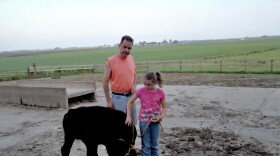-
Reaching a goal of 1,000 buffalo will require more land and fencing. An alliance of tribal nations may help.
-
Consolidation in ag, higher input prices, land access issues and other obstacles are making it hard for young farmers to gain a foothold in U.S. agriculture
-
Treinta y seis estados han detectado casos de CWD (enfermedad del desgaste crónico), pero muchos cazadores temen más de perder las piezas de caza más que la propia enfermedad.
-
Thirty-six states have detected cases of CWD, but many hunters are more fearful of losing game than the disease itself.
-
As the state limits sharing of independent data, the Trump administration is delaying new testing requirements for dozens of chemical plants around the Mississippi River Basin.
-
It’s not just that sea levels are rising. Scientists believe fossil fuel extraction and river engineering are also factors behind coastline disappearance.
-
Five activists in Wisconsin share how belief has driven them to be better stewards of the earth
-
Mientras los agricultores enfrentan vientos contrarios históricos y dificultades del mercado, aumentan las llamadas a la línea directa nacional de Farm Aid y a la línea directa de Iowa Concern.
-
The Trump administration has announced $12 billion in relief for farmers but that won’t cover all their losses.
-
As farmers face historic headwinds and market hardships, calls to the national Farm Aid hotline and the Iowa Concern hotline are increasing.
Play Live Radio
Next Up:
0:00
0:00
Available On Air Stations








